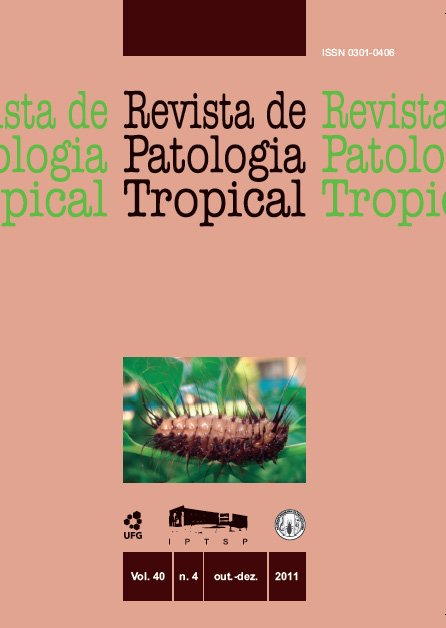AVALIAÇÃO DA FREQUÊNCIA DE PARASITOS INTESTINAIS E DO ESTADO NUTRICIONAL EM ESCOLARES DE UMA AREA PERIURBANA DE SALVADOR, BAHIA, BRASIL
DOI:
https://doi.org/10.5216/rpt.v40i4.16762Palavras-chave:
Enteroparasitoses, Estado nutricional, Escolares.Resumo
A elevada prevalência de parasitos intestinais nos países subdesenvolvidos se deve, principalmente,às precárias condições de saneamento básico e ao baixo nível de escolaridade da população. Estetrabalho avaliou a associação entre frequência dos parasitos intestinais e estado nutricional etambém o perfil socioeconômico dos alunos da primeira à quarta série de uma escola municipaldo bairro Jardim Valéria, subúrbio de Salvador, Bahia, Brasil. A análise parasitológica foi realizadaem 200 estudantes pelo método de Hoffman-Pons-Janer. O estado nutricional foi avaliadosegundo a classificação de Waterlow, utilizando-se a curva padrão adotada pelo National Center ofHealth Statistic. Os resultados demonstraram uma prevalência de 94% (188/200) de infecção porenteroparasitos, sendo a faixa etária mais atingida a de 6 a 9 anos. Os parasitos com frequência maiselevada foram: Entamoeba coli (43,5%), Ascaris lumbricoides (25%), Endolimax nana (22%) eEntamoeba histolytica/E. dispar (21,5%). Em relação à diversidade de parasitos, 39% das criançasinfectadas apresentavam monoparasitismo; 33%, biparasitismo e 22%, multiparasitismo. A análisedo estado nutricional de 147 alunos na faixa etária de 6 a 10 anos mostrou que 15% tinham déficitnutricional. No entanto, não foi demonstrada uma correlação positiva entre crianças parasitadas edéficit nutricional, em razão da elevada frequência de crianças parasitadas (78,9%) classificadascomo eutróficas. Os dados deste estudo confirmam a elevada prevalência de parasitos intestinaise má nutrição entre os escolares de populações de baixa renda. Em conseqüência, destaca-se aimportância de programas de educação em saúde para prevenção de infecções parasitárias e daadoção de medidas que melhorem o estado nutricional das crianças.Downloads
Downloads
Publicado
Como Citar
Edição
Seção
Licença
The manuscript submission must be accompanied by a letter signed by all authors stating their full name and email address, confirming that the manuscript or part of it has not been published or is under consideration for publication elsewhere, and agreeing to transfer copyright in all media and formats for Journal of Tropical Pathology.

